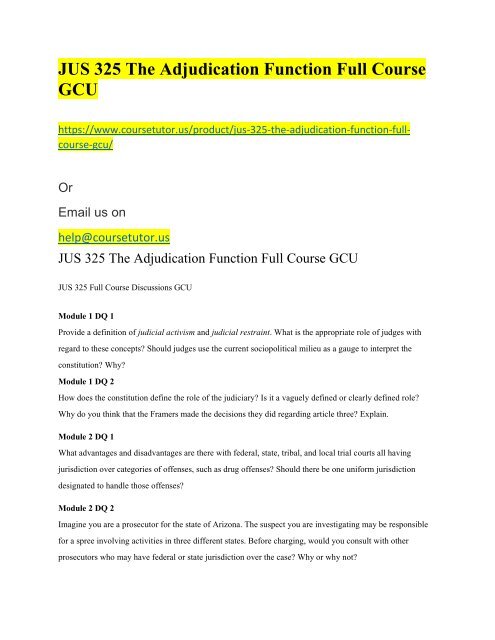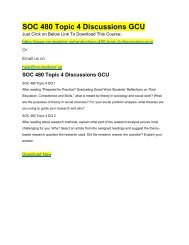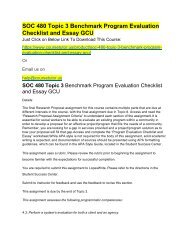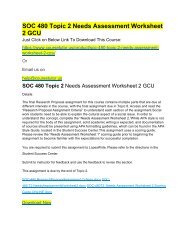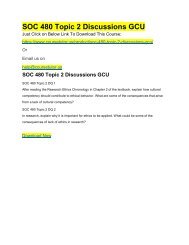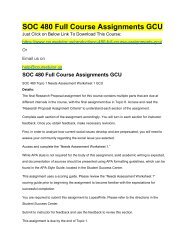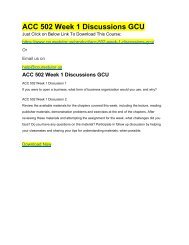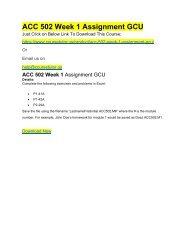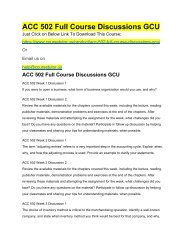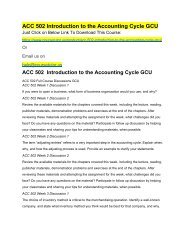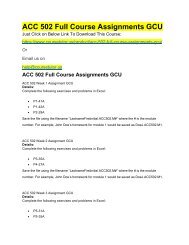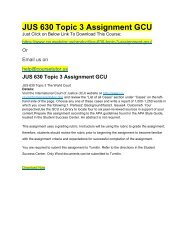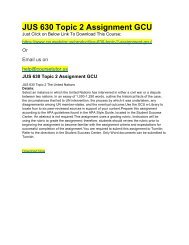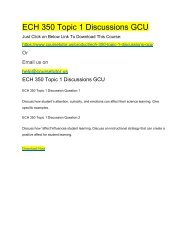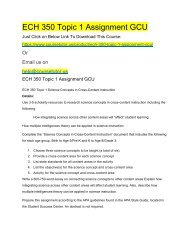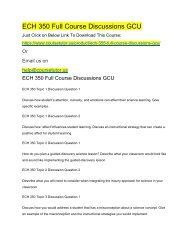JUS 325 The Adjudication Function Full Course GCU
Create successful ePaper yourself
Turn your PDF publications into a flip-book with our unique Google optimized e-Paper software.
<strong>JUS</strong> <strong>325</strong> <strong>The</strong> <strong>Adjudication</strong> <strong>Function</strong> <strong>Full</strong> <strong>Course</strong><br />
<strong>GCU</strong><br />
https://www.coursetutor.us/product/jus-<strong>325</strong>-the-adjudication-function-fullcourse-gcu/<br />
Or<br />
Email us on<br />
help@coursetutor.us<br />
<strong>JUS</strong> <strong>325</strong> <strong>The</strong> <strong>Adjudication</strong> <strong>Function</strong> <strong>Full</strong> <strong>Course</strong> <strong>GCU</strong><br />
<strong>JUS</strong> <strong>325</strong> <strong>Full</strong> <strong>Course</strong> Discussions <strong>GCU</strong><br />
Module 1 DQ 1<br />
Provide a definition of judicial activism and judicial restraint. What is the appropriate role of judges with<br />
regard to these concepts? Should judges use the current sociopolitical milieu as a gauge to interpret the<br />
constitution? Why?<br />
Module 1 DQ 2<br />
How does the constitution define the role of the judiciary? Is it a vaguely defined or clearly defined role?<br />
Why do you think that the Framers made the decisions they did regarding article three? Explain.<br />
Module 2 DQ 1<br />
What advantages and disadvantages are there with federal, state, tribal, and local trial courts all having<br />
jurisdiction over categories of offenses, such as drug offenses? Should there be one uniform jurisdiction<br />
designated to handle those offenses?<br />
Module 2 DQ 2<br />
Imagine you are a prosecutor for the state of Arizona. <strong>The</strong> suspect you are investigating may be responsible<br />
for a spree involving activities in three different states. Before charging, would you consult with other<br />
prosecutors who may have federal or state jurisdiction over the case? Why or why not?
Module 3 DQ 1<br />
Explain the purpose of the Fifth Amendment. Why would the founders include such a provision in the Bill of<br />
Rights? Is such a provision necessary?<br />
Module 3 DQ 2<br />
Explain the purpose of the eighth amendment. Why would the founders include such a provision in the Bill of<br />
Rights? Is such a provision necessary?<br />
Module 4 DQ 1<br />
How does one become a Judge? Do you agree with the process? Explain.<br />
Module 4 DQ 2<br />
In Arizona as well as in many other states, the Attorney General and the county attorneys are elected into<br />
office for 4 years. What are the pros and cons of filling these offices by election rather than appointment?<br />
Module 5 DQ 1<br />
What are the most common methods for criminal court cases to be dismissed in pre-trial procedures? (For<br />
example, plea bargains) Do these methods properly protect a criminal defendant’s civil liberties?<br />
Module 5 DQ 2<br />
How much involvement should a victim have in a criminal court proceeding? Should a victim be able to read<br />
a victim impact statement? Whose rights are more important in a criminal proceeding, the criminal defendant<br />
or the victim? Explain.<br />
Module 6 DQ 1<br />
What are the various forms of plea bargaining? Under what conditions would each be used?<br />
Module 6 DQ 2<br />
Under what circumstances should a judge participate in plea negotiations? Would you want a judge who was<br />
a notorious hardliner in terms of sentencing on drug cases to participate in negotiations if you were the<br />
defendant in the above case? Remember that negotiations can fail; how might a failure in negotiation affect<br />
the outcome?<br />
Module 7 DQ 1<br />
What are Intermediate sanctions? In what circumstances might intermediate sanctions be appropriate?<br />
Explain.
Module 7 DQ 2<br />
What components make up the sentencing process? Which components fall within the judge’s discretion<br />
versus what a jury must decide?<br />
Module 8 DQ 1<br />
Describe the Federal Appellate system. How does one get a case before the Appellate judiciary? How<br />
influential are the appellate courts amongst one another? Explain.<br />
Module 8 DQ 2<br />
Describe the typical composition and procedural process of an Appellate court. What type of argumentation<br />
does an appellate court hear? Why are appellate court decisions important to the judiciary? Explain.<br />
<strong>JUS</strong> <strong>325</strong> <strong>Full</strong> <strong>Course</strong> Assignments <strong>GCU</strong><br />
<strong>JUS</strong> <strong>325</strong> Module 1 Benchmark – Marbury v. Madison<br />
Details:<br />
In an essay of 750-1,000 words, address the following:<br />
1. What is the historical backdrop of Marbury v. Madison?<br />
2. What was Justice Marshall’s rationale in reaching his final ruling in the case?<br />
3. What is the significance of Marbury v. Madison?<br />
4. Is the decision of Marbury v. Madison in keeping with the intent of the Constitution for the role of<br />
the Judiciary? (Comp. 1.2)<br />
Utilize three to five relevant, scholarly sources in support of your content.<br />
Prepare this assignment according to the guidelines found in the APA Style Guide. This guide is located in<br />
the Student Success Center. An abstract is not required.<br />
This assignment uses a rubric. Please review the rubric prior to beginning the assignment to become familiar<br />
with the expectations for successful completion.<br />
You are required to submit this assignment to Turnitin. Refer to the directions in the Student Success Center.<br />
This assignment assesses programmatic competency 2.1: Explain the steps of criminal procedures from<br />
arrest to sentencing.
<strong>JUS</strong> <strong>325</strong> Module 2 Jurisdiction Essay<br />
Details:<br />
Write an essay of 750-1,000 words in which you:<br />
1. Address federal and state jurisdiction in criminal cases.<br />
2. Explain why we have so many different court jurisdictions for criminal offenses.<br />
3. Explain whether the plethora of jurisdictions enhance or detract from the imposition of justice<br />
throughout the country. Provide your reasoning.<br />
Use the <strong>GCU</strong> Library to locate three to five relevant, scholarly sources in support of your content.<br />
Prepare this assignment according to the APA guidelines found in the APA Style Guide. This guide is located<br />
in the Student Success Center. An abstract is not required.<br />
This assignment uses a rubric. Please review the rubric prior to beginning the assignment to become familiar<br />
with the expectations for successful completion.<br />
You are required to submit this assignment to Turnitin. Refer to the directions in the Student Success Center.<br />
<strong>JUS</strong> <strong>325</strong> Module 3 Speedy Trial<br />
Details:<br />
In an essay of 750-1,000 words, address the following:<br />
1. What is the importance of having a speedy trial?<br />
2. How does one determine whether a trial has been “speedy”?<br />
3. Use Findlaw, Cornell Law, or Lexis-Nexis in the <strong>GCU</strong> Library to locate one appellate court case<br />
that has assisted us with interpreting the right to a speedy trial. Why is this case important?<br />
Utilize three to five relevant, scholarly sources in support of your content.<br />
Prepare this assignment according to the guidelines found in the APA Style Guide. This guide is located in<br />
the Student Success Center. An abstract is not required.<br />
This assignment uses a rubric. Please review the rubric prior to beginning the assignment to become familiar<br />
with the expectations for successful completion.<br />
You are required to submit this assignment to Turnitin. Refer to the directions in the Student Success Center.
<strong>JUS</strong> <strong>325</strong> Module 4 Players of the Court Interview and Essay<br />
Details:<br />
Interview a prosecutor, criminal defense attorney, or judge for approximately 45 minutes on the respective<br />
roles of each of the three in the criminal justice system.<br />
In addition to the interview, conduct your own research about the responsibilities and roles of each in the<br />
criminal justice system.<br />
Write an essay (750-1,000 words) in which you summarize the results of your interview and include<br />
a comparison of the interview responses with what you discovered in your research of the three roles.<br />
Organize your essay to sequence the steps of procedural law from the time a person is arrested until they are<br />
sentenced while describing the roles of the court players in the various steps.<br />
Use the <strong>GCU</strong> Library to locate three to five relevant, scholarly sources in support of your content.<br />
Prepare this assignment according to the APA guidelines found in the APA Style Guide, located in the<br />
Student Success Center. An abstract is not required.<br />
This assignment uses a rubric. Please review the rubric prior to beginning the assignment to become familiar<br />
with the expectations for successful completion.<br />
You are required to submit this assignment to Turnitin. Refer to the directions in the Student Success Center.<br />
<strong>JUS</strong> <strong>325</strong> Module 5 Criminal Trial Essay – First Draft: Outline and Annotated Bibliography<br />
Details:<br />
Construct an outline of 400-500 words for an essay in which you describe the procedural steps in a criminal<br />
trial. Address the following:<br />
1. How does one determine whether or not they have standing to appear in criminal court? Once<br />
standing is confirmed, how does the court administer pre-trial management procedures such<br />
as notice, right to counsel, and whether to terminate the proceedings? Why are these procedures<br />
required for the administration of Justice?<br />
2. Explain what happens during each step of a trial including the purpose each step serves. <strong>The</strong>se<br />
steps should include, at a minimum, the following: opening statements, direct examination, crossexamination,<br />
jury instructions, jury deliberations, rendering a verdict, and sentencing.
3. Analyze and discuss what possible appellate procedures are in place for a criminal defendant.<br />
Explain when an appeal may be a viable option, and when it may not.<br />
Include an Annotated Bibliography section with at least six sources, formatted in APA.<br />
Refer to the resource, “Preparing Annotated Bibliographies,” located in the Student Success Center, for<br />
additional guidance on completing this assignment in the appropriate style, referring to the indicative<br />
annotation protocol.<br />
Prepare this assignment according to the guidelines found in the APA Style Guide, located in the Student<br />
Success Center. An abstract is not required.<br />
This assignment uses a rubric. Please review the rubric prior to beginning the assignment to become familiar<br />
with the expectations for successful completion.<br />
You are required to submit this assignment to Turnitin. Refer to the directions in the Student Success Center.<br />
<strong>JUS</strong> <strong>325</strong> Module 6 Plea Bargain Essay<br />
Details:<br />
Your essay should include the following two offers:<br />
Assuming the role of a prosecutor prepare a plea offer for Mario. Assume he was charged with possession of<br />
methamphetamine and with DUI (with a blood alcohol content of .08/.09).<br />
Assuming the role of defense counsel, prepare a counter-offer, following the same structure as outlined<br />
above.<br />
You can be creative with realistic details that you provide, consistent with the parameters of the facts above,<br />
but each offer should be persuasive.<br />
Write an essay of 750-1,000 words in which you:<br />
1. Explain what you would offer the opposing side.<br />
2. Describe what factors you would consider in your offer.<br />
3. Include a paragraph justifying your offer.<br />
Use the <strong>GCU</strong> Library to locate three to five relevant, scholarly sources in support of your content.<br />
Prepare this assignment according to the APA guidelines found in the APA Style Guide, located in the<br />
Student Success Center. An abstract is not required.
You are required to submit this assignment to Turnitin. Refer to the directions in the Student Success Center.<br />
<strong>JUS</strong> <strong>325</strong> Module 7 Aggravating and Mitigating Essay<br />
Details:<br />
Write an essay (750-1,000 words) explaining factors that are normally considered aggravating and mitigating<br />
circumstances.<br />
1. Step one: Select a death-row inmate from the Arizona Department of corrections website.<br />
2. Step two: Research your selected inmate and identify aggravating and mitigating circumstances<br />
that placed him/her on death row.<br />
3. Step three: Describe exactly why your case facts are mitigating and aggravating based on the<br />
explanation given in your assigned readings. Be sure to cite all of your sources. Evaluate why the<br />
factors of this case merited the sentence of death.<br />
Use the <strong>GCU</strong> Library to locate three to five relevant, scholarly sources in support of your content.<br />
Prepare this assignment according to the APA guidelines found in the APA Style Guide, located in the<br />
Student Success Center. An abstract is not required.<br />
This assignment uses a rubric. Please review the rubric prior to beginning the assignment to become familiar<br />
with the expectations for successful completion.<br />
You are required to submit this assignment to Turnitin. Refer to the directions in the Student Success Center.<br />
<strong>JUS</strong> <strong>325</strong> Module 8 Benchmark-Criminal Trial Essay – Final Draft<br />
Details:<br />
From instructor feedback, revise your first draft of the Criminal Trial Essay Outline and Annotated<br />
Bibliography.Write an essay of 1,250-1,500 words in which you describe the procedural steps in a criminal<br />
trial. Address the following:<br />
1. How does one determine whether or not they have standing to appear in criminal court? Once<br />
standing is confirmed, how does the court administer pre-trial management procedures such<br />
as notice, right to counsel, and whether to terminate the proceedings? Why are these procedures<br />
required for the administration of Justice? (comp. 4.1)<br />
2. Explain what happens during each step of a trial, including the purpose each step serves. <strong>The</strong>se<br />
steps should include, at a minimum, the following: opening statements, direct examination, cross -<br />
examination, jury instructions, jury deliberations, rendering a verdict, and sentencing.<br />
3. Analyze and discuss what possible appellate procedures are in place for a criminal defendant.<br />
Explain when an appeal may be a viable option, and when it may not.
Use the <strong>GCU</strong> Library to locate four to six relevant, scholarly sources in support of your content.<br />
Prepare this assignment according to the guidelines found in the APA Style Guide, located in the Student<br />
Success Center. An abstract is not required.<br />
This assignment uses a rubric. Please review the rubric prior to beginning the assignment to become familiar<br />
with the expectations for successful completion.<br />
You are required to submit this assignment to Turnitin. Refer to the directions in the Student Success Center.<br />
This assignment assesses programmatic competency 4.1: Evaluate the legal requirements for case<br />
management procedures.<br />
<strong>Course</strong> Tutor helps in providing the best essay writing service. If you need 100% original papers for <strong>JUS</strong> <strong>325</strong><br />
<strong>The</strong> <strong>Adjudication</strong> <strong>Function</strong> <strong>Full</strong> <strong>Course</strong> <strong>GCU</strong>, then contact us through call or live chat.<br />
Download Now


